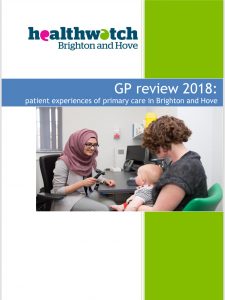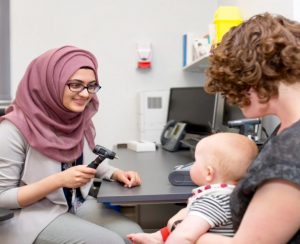Too many patients find making a doctor’s appointment frustrating in Brighton and Hove but most are happy with their care once they are seen.
The findings follow a survey of almost 1,500 patients at 40 local GP (general practice) surgeries highlighting the growing pressures on family doctors.
The frustrations are in part the result of doctors in the area having on average a third more patients each than the typical 1,762 patients in practices around the country.
Healthwatch Brighton and Hove, which carried out the research, said that a greater reliance on GPs is at the heart of major changes in the way that the NHS operates.
But it said: “Four practices, 11 per cent of the total, had more than 4,000 patients per doctor – one of which had more than 6,000 patients.
“The extent of variation across practices is likely to impact the availability of doctors for consultations.
“We consider it a matter of concern that at a quarter of practices (9 of 36) an average of over 3,000 patients were served by each full-time GP.
“The practices with the two highest numbers of patients per GP were among the three lowest performing practices on the seven key performance indicators measuring quality of care.
“This suggests there is a relationship between high patient caseloads and poorer patient experience.
“Low provision of doctors to patients is likely to lead to difficulty accessing appointments and long appointment waits along with increased pressures on emergency health services.”
The Healthwatch report also said: “Eight GP practices have closed since February 2015 leading to reduction from 44 to 36 at the end of 2017.
“The number of GPs has also fallen, with 132 FTE (full-time equivalent) GPs in September 2017 compared to 135 the previous year.
“This means there are currently 2,394 patients on average for each GP in Brighton and Hove – more than the England average figure of 1,762 patients for each GP.
“Fewer practices and fewer doctors are likely to put strain on the primary care service in the city.
“Patients may find it more challenging to travel to practices to attend appointments.
“Fewer doctors are likely to lead to fewer appointment slots for patients making it more difficult to receive treatment.”

Health chiefs at the Brighton and Hove Clinical Commissioning Group (CCG) have warned that more doctors’ surgeries are at risk of closure, especially some of the smaller practices.
Recruitment has become harder and a significant number of family doctors are reaching retirement age.
Despite the pressures, the level of patient satisfaction was high once patients saw a doctor or nurse, Healthwatch said.
Its “GP review 2018” – subtitled Patient experiences of primary care in Brighton and Hove – said: “Our review found mixed results on accessing appointments but generally strong performance on providing high quality of care.
“Patients were pleased with the health care they received but were sometimes frustrated at the difficulty in accessing it.
“Patients received significantly different levels of service depending on the practice they used.
“Experience of appointment waiting times, opening hours and the quality of care provided could be dramatically different across practices.
“Patients across many practices experienced difficulties in accessing services with difficulties booking appointments and long waits between booking and date of appointment.
“A third of patients, 32 per cent, reported they had found it ‘difficult’ to book an appointment by phone the most common method of booking appointments.
“Overall, patients’ perception of quality of care was high with an average of 85 per cent for GPs and 90 per cent for nurses.
“Most patients liked to see their ‘own’ doctor – a doctor who has some knowledge of their personal health history.
“Almost two thirds, 64 per cent, of patients said it was important for them to see their ‘own’ doctor but only half, 48 per cent, said they actually did.”
Healthwatch flagged up “low satisfaction with out of hours services”. It said: “A fifth of patients said they had to get medical help after being unable to get a doctor’s appointment.
“All the services used received mixed satisfaction levels, with pharmacies and the Brighton Station walk-in centre achieving the highest satisfaction among non-emergency services.”
Healthwatch made 13 recommendations
* Improve consistency of quality across practices
Patients experienced significant variation in the quality of services depending on the practice they used. Low-performing practices should improve their service on key performance criteria, eg, extending opening hours, making booking systems easier to use and lowering waits for appointments. These improvements are likely to increase overall patient satisfaction.
* Reduce patient caseloads for certain practices
A large number of practices in the city have high patient caseloads. Low provision of doctors to patients is likely to lead to difficulty accessing appointments and long appointment waits along with increased pressures on emergency health services. All practices in the city should have the number of patients per FTE GP close to the average for England of 1,762. All but four practices in the city have higher than this number of patients per GP, four of which have over 4,000.
* Lower urgent appointment wait times
Fourteen per cent of patients were not able to make a same-day appointment at their practice for an urgent problem and two practices had an average wait time of one and a half days days for urgent appointments. All practices should provide same-day appointments for urgent issues.
* Lower GP routine appointment wait times
There was significant variation between practices in wait times for routine GP appointments ranging from an average of one day to 12 days. Almost a third of practices had an average of over eight days. There is not currently an NHS target for appointment wait times. However, we believe practices with long average waits should make an effort to provide more timely routine appointments.
* Ensure all practices offer weekday evening and Saturday hours
All practices should offer consultations to their patients on weekday evenings and Saturday in addition to regular business hours. This might be offered via consortia or through outside organisations.
* Maximise use of phone consultations
Patients reported high levels of satisfaction with phone consultations yet practices varied greatly in their use of them. Practices with only limited current use should aim to increase their use for patients who wish to use it while ensuring in person consultations are also available as an option.
* Encourage patient use of online booking
Most patients find booking appointments online easy and convenient yet take-up by patients in Brighton and Hove is only 18 per cent. Practices should make a concerted effort to encourage patients to use their online booking system.
* Ensure all practices have efficient and patient-friendly phone booking systems
A third of patients found it difficult to book an appointment by phone which is the most common method of booking appointments. Yet there was large variation in how easy patients found using their practice’s booking system. Practices need to improve their systems where patients are experiencing difficulties. The CCG and practices should identify good practice and encourage improvement across the city.
* Lower appointment wait times on day
Patients had to wait an average of 13 minutes beyond the scheduled appointment time with some practices with significantly longer average waits. All practices should aim to improve the timeliness of appointments to minimise inconvenience for patients.
* Practices should accommodate patients’ preference for own doctor
Two thirds of patients consider it important to see their own doctor but only half actually do so. Practices should maximise the availability of regular doctors so that patients have the option of seeing their own doctor at a consultation.
* Encourage use of pharmacies for non-emergency medical help
A fifth of patients said they had to get medical help after being unable to get a doctor’s appointment. Among the non-emergency services used patients were most satisfied with the help they received from pharmacies. This confirms the value of efforts to increase the use of pharmacies by patients when they cannot access a GP. Commissioning health authorities such as NHS England and the local CCG should continue to raise the awareness of pharmacies as a source of non-emergency medical help.
* Improve disabled-friendly seating in waiting rooms
All practices should provide adequate amounts of disabled-friendly seating, eg, large seats with high backs and arm rests.
* Reduce long waits for referrals to specialist treatment
Fourteen per cent of referrals to specialist treatment did not meet the maximum 18-week wait NHS standard. All referrals to specialist treatment should meet this standard.









most people at my doctors. dont mind waiting over there time of appoment. as the doctors have the time for you. not like some you are in and out with in a min. and you can get a appoment when you want.staff very helpfull and all have time for there patients
I am happy to use an online booking system but my GP’s surgery only permits online appointments to be made with a doctor, and not for blood tests or to see a nurse. The GP I prefer to see only works one day a week so it can become a juggling act to arrange suitable appointments.
It recently took me over a month of calling at the magic hour when bookings start to arrange a blood test, after which I booked a doctor’s appointment in seconds online.
Where’s the sense in that?